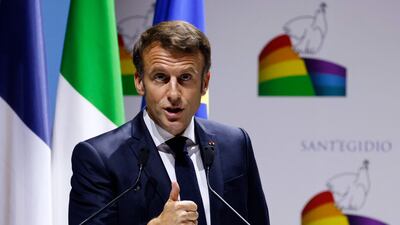It is up to Ukraine to decide the time and terms of peace with Russia, French President Emmanuel Macron said on Sunday.
Mr Macron said the international community would be there when the Ukrainian government chose that time.
He was addressing the opening of a three-day peace conference in Rome.
“To stay neutral would mean accepting the world order of the strongest, and I don’t agree with this,” Mr Macron said at the conference, organised by a Catholic charity.
There is concern that support from Ukraine’s allies in Europe might be eroded due to soaring energy costs with the approach of winter.
Pope Francis is due to conclude the Cry for Peace conference, sponsored by the Sant’Egidio Community, with a speech on Tuesday at the Colosseum in Rome.
Throughout the war that began with Russia’s invasion of Ukraine eight months ago, the pope has warned against an arms build-up. But he has said Ukraine has the right to defend itself.
Mr Macron’s visit to Italy includes an audience with the pope at the Vatican on Monday.
Ukraine war latest - in pictures

































He addressed concerns that any talk of peace could be taken as a sign of lack of support for Ukraine.
“To speak of peace now, call for peace, might seem unbearable for those who are fighting for freedom — it seems like a betrayal” of Ukraine, Mr Macron said.
But peace cannot be “captured by Russian power. Peace can’t be the consecration of the law of the strongest, nor can it be a ceasefire [marking] the state of affairs".
“We want the Ukrainian people to decide at a certain point, peace, the moment and the terms of peace,” Mr Macron said.
“Peace will be built with the other [party], who today is the enemy, around a table and the international community will be there.”
He referred to his past meetings with Russian President Vladimir Putin, the war’s architect.
Moscow’s aggression is “the fruit of exaggerated nationalism” and feeling isolated, the French leader said, adding that the aggression was unjustified.
“They were convinced that there were threats; that the rest of the world, the western world at least, would have tried to destroy Russia,” he said.
Ukraine bomb shelter is the only home 6-month-old Zhenia has known - video
Mr Macron warned against growing sentiments for nationalism on the European continent, where far-right political forces have gained popularity in some nations.
He exhorted the many religious leaders at the conference to foster ”resistance against the folly of war.”
Mr Macron condemned that “the Orthodox religion is being manipulated by Russia". He did not elaborate.
Russian Orthodox Patriarch Kirill has fervently backed Mr Putin in the war against Ukraine, calling the invasion part of a “metaphysical” battle against the West.
Keenly aware of Mr Kirill’s closeness to Mr Putin, Pope Francis has sought, so far in vain, to meet the patriarch during the war.
Ultimately, Mr Macron said, nurturing peace in Europe depended on “equilibrium of respect, reciprocity, justice".
He cautioned against efforts in Europe to “drive out the ‘other’ in our society” in a quest for “ethnic purity, religious purity".



